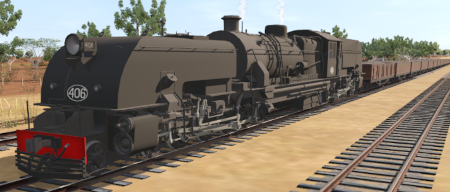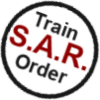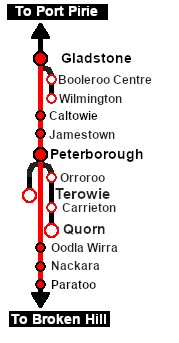| Express bulk ore freight from Broken Hill to Port Pirie. |
 |
The Historical Bit
The line from Port Pirie to Cockburn on the South Australia - New South Wales border was built in stages from 1875 to 1888 largely to capture the lead, zinc and silver ore traffic from the mines at Broken Hill just over the border in New South Wales. Because the SAR was not allowed to operate into New South Wales, a private railway, the Silverton Tramway, was created to carry the ore across the border. The SAR and Silverton Tramway simply swapped locos at Cockburn on the border. It was called a "tramway" to get around a NSW law banning private railways but not private tramways. Despite the title it was a fully operating heavy haul railway, and one of the most profitable in the country.
The SAR had a monopoly on the ore traffic until 1919 when the NSWGR (New South Wales Government Railways) completed its own standard gauge (4ft 8½in) line from Sydney to Broken Hill but the SAR continued to carry the bulk of the ore because the port and smelter at Port Pirie was much closer to Broken Hill.
A variety of motive power was used on the ore trains. SAR Y class locos were originally used then the SAR T class took over until they were largely replaced by the SAR 406 class locos in the 1950s. In the 1960s the SAR 830 class (narrow gauge) diesel locos started appearing.
By 1970 the narrow gauge line from Port Pirie to Broken Hill had been converted to standard gauge and the Silverton Tramway ceased its ore hauling operations but continues to operate today providing standard gauge shunting services and loco leasing to other rail operators. The SAR 830 class (standard gauge) diesels continued to haul the ore trains well into the 2000s.
 |
| Era: |
1950s and 1960s |
| Duration: |
Peterborough: 1 hour 25 minutes (includes refuelling time)
Gladstone: 2 hours 45 minutes |
| Loco: |
SAR 406 (Garrett) on the Main line approaching Paratoo from the East
The  has locos available at the Peterborough Loco Depot for an optional loco swap has locos available at the Peterborough Loco Depot for an optional loco swap
|
| Consist: |
Attached to SAR 406
|
|
|
 |
Each location in the layout has a detailed set of track diagrams that provide a variety of useful information
The Getting Started guide below gives a summary of what is available.
To display this information click any  graphic, or go to the bottom of the page for all the session links (all links will open in this window). graphic, or go to the bottom of the page for all the session links (all links will open in this window). |
Getting Started:
- If you have already closed the opening message window then the first step is to pause the session by pressing the P key.
- Next locate your loco. Either:-
- Open the Finder Tool (press Ctrl F ) and type, in the Name field, the name of the loco, in this case SAR 406 (or just 406 should be enough). Click the tick icon, OR
- Open the Driver List (bottom left of the screen) and then scroll through the list to find the loco name (SAR 406) then click the drivers Eye icon
 to take control of the loco to take control of the loco
- Take a few moments to get your bearings. Click
 (this link will open in this window) to show the location details and track plans for Paratoo. In each location details page:- (this link will open in this window) to show the location details and track plans for Paratoo. In each location details page:-
- the
 tab gives an overall summary of each location with a "potted" history (where available). tab gives an overall summary of each location with a "potted" history (where available).
- the
 tab reveals the invisible tab reveals the invisible  Track Marks for Drive To commands. Track Marks for Drive To commands.
- the
 tab lists all active industries and their commodities. tab lists all active industries and their commodities.
- the
 tab describes the names, locations and settings of all junction switches as well as some switch sets you may want to use. tab describes the names, locations and settings of all junction switches as well as some switch sets you may want to use.
- Each location details page has direct links to the adjacent locations so you can explore along the route.
- When you are ready to start, reload the Peterborough Base Session page (click the Scenarios button on your current location page) and select this Scenario again or just use the Back button on your browser - whichever is quicker.
- Switch back to Driver Mode and either close the opening message window or press the P key to start the session.
|
|
Tutorial:
 |
A tutorial on using these scenarios is provided in the link on the left. The link will open in this window |
|
Orders:
- Move the train into Paratoo Yard on the Main Line
- Fill the tender with water at the Water Column or proceed to Nackara and fill with water at the Water Column located there.
- Proceed to Peterborough Loop or Peterborough Yard 1 .
- Detach the loco and proceed to Peterborough Main Loco Fuel & Water Point to refuel the tender with bunker c oil and water.
- Option: Reattach the loco, or another available loco, to the train and proceed by 09:30 to Gladstone Yard . If you are replacing the 400 class with a different type of loco at Peterborough then you are advised to double-head.
|
 |
|
|
|
This page was created by Trainz user pware in February 2021 and was last updated as shown below.









